- Surfeit Matt Barber 6:17
Embed
Copy and paste this code to your site to embed.
- Severall Vigorous Mammoths 1:26
Embed
Copy and paste this code to your site to embed.
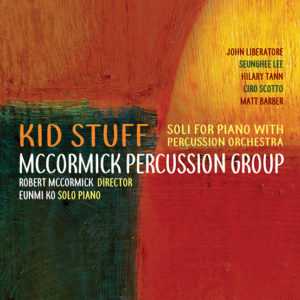

- Kid Stuff: Five Figments for Piano and Percussion: Chimera Eunmi Ko, McCormick Percussion Group 5:23
- Kid Stuff: Five Figments for Piano and Percussion: Night Owl Eunmi Ko, McCormick Percussion Group 4:55
- Kid Stuff: Five Figments for Piano and Percussion: Quench Eunmi Ko, McCormick Percussion Group 5:43
- Kid Stuff: Five Figments for Piano and Percussion: Cuddleys Eunmi Ko, McCormick Percussion Group 2:04
- Kid Stuff: Five Figments for Piano and Percussion: Goofball Eunmi Ko, McCormick Percussion Group 4:42
Embed
Copy and paste this code to your site to embed.
| 1. | Chimera |
| 2. | Night Owl |
| 3. | Quench |
| 4. | Cuddleys |
| 5. | Goofball |
Kid Stuff is a collection of five compositions written for and dedicated to Eunmi Ko, Robert McCormick and the McCormick Percussion Group. The pieces are about childhood, and about various aspects of my own childhood.
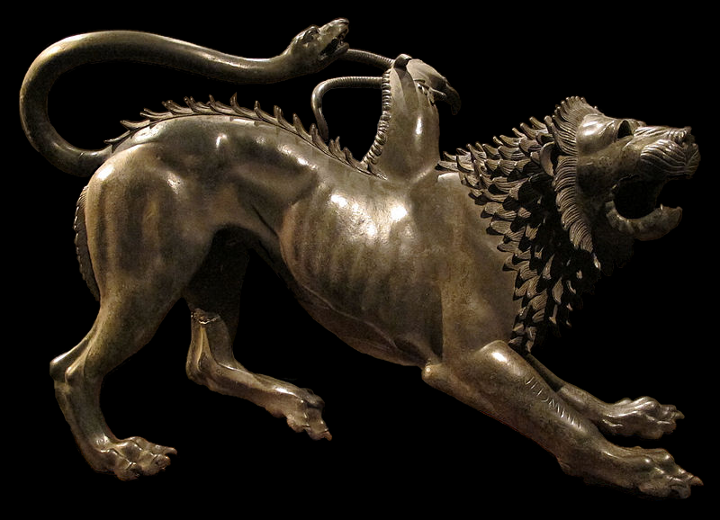
A Chimera is a mythical beast built from the parts of three animals (usually lion, goat, and serpent). I vividly remember their appearance in the bestiaries of video games I was fond of in my tweens. “Chimera” has also come to mean something wished for that can only be achieved in the imagination, or in dreams. My piece involves elements from each shade of meaning. It is a fantasia in three parts, grafted onto each other without transition: the first is breakneck loud music; the middle is softer with virtuosic but lyrical passages in the piano interspersed with ostinati in the percussion; the final is structured cacophony with piano and ensemble both shifting tempo independent of one another underneath occasional extroverted outbursts from everyone. All this music employs piano and percussion techniques not always traditionally suited to the instruments, which creates an “imaginary” sound world where everyone pushes against – and in places probably exceeds – the limits of physical possibility. The musical ideas are often inchoate and fleeting, disappearing just before they are apprehended.

I composed Night Owl very slowly over the course of six months while my twin daughters were infants, a time when I was spending a great deal of time awake at night, listening. Having grown up a block from a busy interstate amid factories, truck stops and a rail yard, I do not associate nighttime with quiet, but rather with secret, ominous sounds that occur intermittently over the constant hum of machinery and traffic. The music of Night Owl therefore might be surprisingly clangorous in places. The piano opens with an ascending series of chords, an idea which it develops obsessively over the course of the piece as though it’s keeping night watch and struggling to stay alert and responsive.
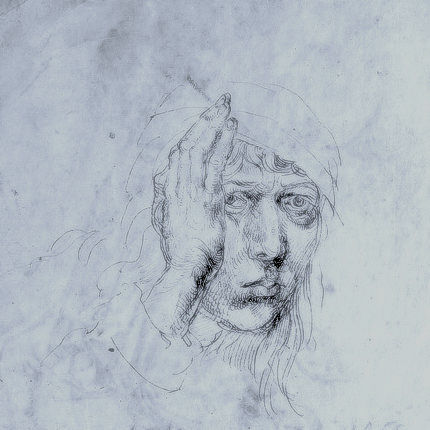
In movement 3, I am thinking of two usages of Quench: to quench thirst, and to quench fire. When used figuratively about oneself, these senses can be used to refer to “alleviation” and “repression,” respectively. This movement is about seeking fulfillment in an otherwise stifling environment, and pulls personally from finding solace in music and mathematics during a bout of depression stemming from bullying in adolescence. I’ve used a few “found object” sounds, most of which I associate with that time of my life, or other times of relief from depression; a melody that recurs at the end of each section is one I woke up from a dream humming one morning during a particularly difficult time.
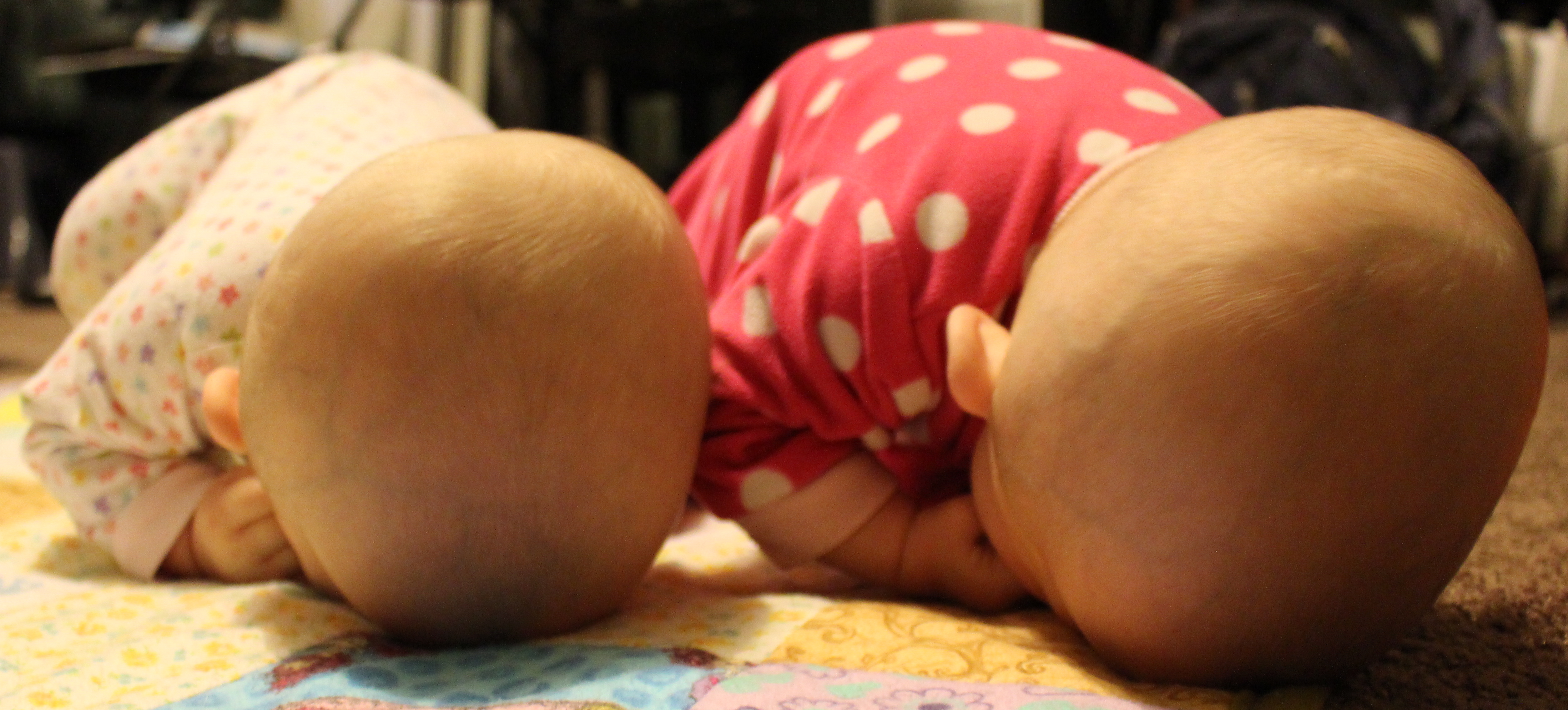
Cuddleys – my twin daughters were born prematurely after a dangerous pregnancy, but they pulled through marvelously. My wife and I sometimes call them our “Cuddlies.” A year after they were born I came upon a passage very early in James Joyce’s Finnegans Wake, which describes a time of great chaos and confusion, and in the midst of that comes the line, “What chance cuddleys…” as if to ask, “what chance would cuddleys have surrounded by all this danger?” I now spell our girls’ collective name as “Cuddleys,” in order to say “just look at what they did with their chance!” This movement quotes heavily from Chopin’s Berceuse in D♭ major (transposed to G major here), a piece we listened to with them quite often. It depicts some of the confusion that babies must feel when confronted with thousands of new stimuli; this movement ends with the babies falling asleep long before the end of Berceuse.

Goofball has the impulsive character of a child who is showing off after staying up past bedtime, moving from thing to thing and never settling down. The opening motive in the piano’s lowest register permeates the entire virtuosic movement. The first section ends with a brief pause after a quote from Thelonious Monk’s composition Four In One, which involves a subtle transformation of the opening motive. One by one the percussionists move to instruments played with hands as though looking for any surface to drum on to get their energy out, playing snippets of rhythms from video-game music I remember from childhood. Meanwhile the pianist plays two passages of erratically accented runs and rhythms. The first of these passages, accompanied by xylophone, quotes the popular 1920s song A Cup of Coffee, a Sandwich, and You in the accented pitches. This song was used ubiquitously in Looney Tunes cartoons, and like the Monk tune it prominently features a transformation of the opening motive. After a section of rhythmic unison, there is a short reprise of the opening music, which becomes increasingly repetitive and raucous before tiring out completely.


For Chamber Orchestra and Obbligato Piano
For Twelve Saxophones (electronic version)
- Trying To Say – Tear ensemble et cetera 0:58
- Trying To Say – Tock ensemble et cetera 1:10
- Trying To Say – Bounce ensemble et cetera 1:04
- Trying To Say – Drop ensemble et cetera 3:35
- Trying To Say – Dance ensemble et cetera 2:25
- Trying To Say – Breath ensemble et cetera 4:48
Embed
Copy and paste this code to your site to embed.
For Violin, Piano, and Electronic Sounds
- Proleptic Chun-Chim David Leung, Zuzanna Szewczyk Kwon 1:37
- Six Têtes Chun-Chim David Leung, Zuzanna Szewczyk Kwon 1:53
- Anyone's Anodyne Chun-Chim David Leung, Zuzanna Szewczyk Kwon 0:57
- A Passing Nepenthe Chun-Chim David Leung, Zuzanna Szewczyk Kwon 1:32
- Successive Subsumption Chun-Chim David Leung, Zuzanna Szewczyk Kwon 3:07
- O Haupt Chun-Chim David Leung, Zuzanna Szewczyk Kwon 1:14
- Analeptic Chun-Chim David Leung, Zuzanna Szewczyk Kwon 0:13
Embed
Copy and paste this code to your site to embed.
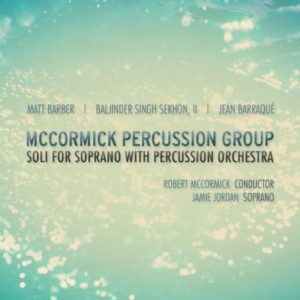
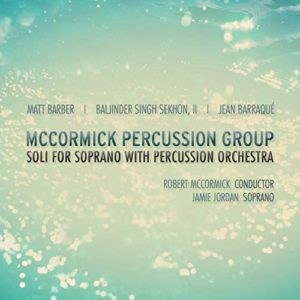
- To the Roaring Wind: Prelude McCormick Percussion Group 2:14
- To the Roaring Wind: Interlude I McCormick Percussion Group 1:31
- To the Roaring Wind: Valley Candle Jamie Jordan; McCormick Percussion Group 2:03
- To the Roaring Wind: Interlude II McCormick Percussion Group 1:24
- To the Roaring Wind: Fabliau of Florida Jamie Jordan; McCormick Percussion Group 6:14
- To the Roaring Wind: Interlude III McCormick Percussion Group 1:30
- To the Roaring Wind: Ploughing on Sunday Jamie Jordan; McCormick Percussion Group 2:26
- To the Roaring Wind: Interlude IV McCormick Percussion Group 1:19
- To the Roaring Wind Jamie Jordan; McCormick Percussion Group 3:56
Embed
Copy and paste this code to your site to embed.
- Quick 2:40
- Crawl 3:50
- Quick 2:42
Embed
Copy and paste this code to your site to embed.
Doug O’Connor, Soprano Sax
Brandon Kies, Alto Sax
Gai Qun, Tenor Sax
Quinn Lewis, Baritone Sax
- Part 1 4:04
- Part 2 3:59
- Part 3 4:51
- Part 4 5:04
Embed
Copy and paste this code to your site to embed.
Shawn Wyckoff, Flute
Megan Marolf, Oboe
Sean Rice, Clarinet
Alexander Popov, Bassoon
- Walnut Matthew Barber 0:54
- Plum Matthew Barber 1:13
- Quince Matthew Barber 1:07
- Kumquat Matthew Barber 1:16
- Pumpkin Matthew Barber 0:51
- Barley Matthew Barber 1:01
Embed
Copy and paste this code to your site to embed.
Trevor Mowry, Alto Instruments
Matt Barber, Tenor Instruments
- Miasmata 7:09
Embed
Copy and paste this code to your site to embed.
Brian Heveron-Smith, Vibraphone
Rob Sanderl, Glockenspiel
Chris Hartford, Tubular Chimes
- Barber's Dozen 13:49
Embed
Copy and paste this code to your site to embed.
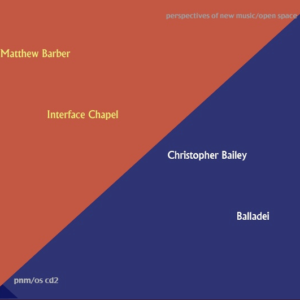

- Interface Chapel, Moon Scott Worthington, Contrabass Solo With Members Of The Ossia New Music Ensemble Under The Batons Of Robert Pierzak And Matthew Barber 1:17
- Interface Chapel, Mineral Scott Worthington, Contrabass Solo With Members Of The Ossia New Music Ensemble Under The Batons Of Robert Pierzak And Matthew Barber 1:03
- Interface Chapel, Octahedron Scott Worthington, Contrabass Solo With Members Of The Ossia New Music Ensemble Under The Batons Of Robert Pierzak And Matthew Barber 0:40
- Interface Chapel, Mercury Scott Worthington, Contrabass Solo With Members Of The Ossia New Music Ensemble Under The Batons Of Robert Pierzak And Matthew Barber 1:10
- Interface Chapel, Air Scott Worthington, Contrabass Solo With Members Of The Ossia New Music Ensemble Under The Batons Of Robert Pierzak And Matthew Barber 0:25
- Interface Chapel, Sanguine Scott Worthington, Contrabass Solo With Members Of The Ossia New Music Ensemble Under The Batons Of Robert Pierzak And Matthew Barber 0:31
- Interface Chapel, Vegetable Scott Worthington, Contrabass Solo With Members Of The Ossia New Music Ensemble Under The Batons Of Robert Pierzak And Matthew Barber 0:25
- Interface Chapel, Sun Scott Worthington, Contrabass Solo With Members Of The Ossia New Music Ensemble Under The Batons Of Robert Pierzak And Matthew Barber 1:15
- Interface Chapel, Icosahedron Scott Worthington, Contrabass Solo With Members Of The Ossia New Music Ensemble Under The Batons Of Robert Pierzak And Matthew Barber 0:09
- Interface Chapel, Phlegmatic Scott Worthington, Contrabass Solo With Members Of The Ossia New Music Ensemble Under The Batons Of Robert Pierzak And Matthew Barber 0:17
- Interface Chapel, Water Scott Worthington, Contrabass Solo With Members Of The Ossia New Music Ensemble Under The Batons Of Robert Pierzak And Matthew Barber 0:17
- Interface Chapel, Venus Scott Worthington, Contrabass Solo With Members Of The Ossia New Music Ensemble Under The Batons Of Robert Pierzak And Matthew Barber 1:01
- Interface Chapel, Animal Scott Worthington, Contrabass Solo With Members Of The Ossia New Music Ensemble Under The Batons Of Robert Pierzak And Matthew Barber 0:34
- Interface Chapel, Sphere Scott Worthington, Contrabass Solo With Members Of The Ossia New Music Ensemble Under The Batons Of Robert Pierzak And Matthew Barber 2:55
- Interface Chapel, Body Scott Worthington, Contrabass Solo With Members Of The Ossia New Music Ensemble Under The Batons Of Robert Pierzak And Matthew Barber 2:03
- Interface Chapel, Aether Scott Worthington, Contrabass Solo With Members Of The Ossia New Music Ensemble Under The Batons Of Robert Pierzak And Matthew Barber 0:28
- Interface Chapel, Dodecahedron Scott Worthington, Contrabass Solo With Members Of The Ossia New Music Ensemble Under The Batons Of Robert Pierzak And Matthew Barber 1:38
- Interface Chapel, Mars Scott Worthington, Contrabass Solo With Members Of The Ossia New Music Ensemble Under The Batons Of Robert Pierzak And Matthew Barber 0:25
- Interface Chapel, Fire Scott Worthington, Contrabass Solo With Members Of The Ossia New Music Ensemble Under The Batons Of Robert Pierzak And Matthew Barber 0:26
- Interface Chapel, Choleric Scott Worthington, Contrabass Solo With Members Of The Ossia New Music Ensemble Under The Batons Of Robert Pierzak And Matthew Barber 0:21
- Interface Chapel, Tetrahedron Scott Worthington, Contrabass Solo With Members Of The Ossia New Music Ensemble Under The Batons Of Robert Pierzak And Matthew Barber 0:24
- Interface Chapel, Jupiter Scott Worthington, Contrabass Solo With Members Of The Ossia New Music Ensemble Under The Batons Of Robert Pierzak And Matthew Barber 0:43
- Interface Chapel, Mind Scott Worthington, Contrabass Solo With Members Of The Ossia New Music Ensemble Under The Batons Of Robert Pierzak And Matthew Barber 1:46
- Interface Chapel, Melancholic Scott Worthington, Contrabass Solo With Members Of The Ossia New Music Ensemble Under The Batons Of Robert Pierzak And Matthew Barber 0:23
- Interface Chapel, Earth Scott Worthington, Contrabass Solo With Members Of The Ossia New Music Ensemble Under The Batons Of Robert Pierzak And Matthew Barber 0:28
- Interface Chapel, Saturn Scott Worthington, Contrabass Solo With Members Of The Ossia New Music Ensemble Under The Batons Of Robert Pierzak And Matthew Barber 1:16
- Interface Chapel, Cube Scott Worthington, Contrabass Solo With Members Of The Ossia New Music Ensemble Under The Batons Of Robert Pierzak And Matthew Barber 1:54
- Interface Chapel, Soul Scott Worthington, Contrabass Solo With Members Of The Ossia New Music Ensemble Under The Batons Of Robert Pierzak And Matthew Barber 1:52
Embed
Copy and paste this code to your site to embed.
- Octahedron 2:19
- Icosahedron 1:50
- Sphere 3:21
- Dodecahedron 1:47
- Tetrahedron 0:41
- Cube 1:47
Embed
Copy and paste this code to your site to embed.
I think this may be the first time I’ve arrived at the title for a piece before I began composing it. The title explains very little of the particulars of the piece, but a great deal of the spirit of its construction. I have long been fascinated with Western classical cosmology, and how natural philosophers were able to make some very brilliant deductions from the cosmological axioms and the tools of observation they had to work with. In this piece I represent many of these concepts fairly loosely in music, and provide a space for them to interact musically. Given the nature of these ideas, I thought a “chapel” might be a nice metaphor for this space in which they “interface” with each other; and of course the title is a play on “Interfaith Chapel.”
On stage sit four different groups of musicians: first, a solo Contrabass in the middle and a pair of loudspeakers in front through which the solo bass is amplified; second, a Contrabassoon and Contrabass Clarinet which form a kind of obbligato pair; third, oboes, clarinets, and cellos; and fourth, four additional loudspeakers situated among the members of the ensemble (in this piece, those speakers do in fact act as individual “musicians”). The piece is in 28 movements, each a miniature devoted to one particular thing or idea. Some of the movements overlap with each other, and some movements even begin and end within the span of another movement.
Each of the movements belongs more or less to a discipline in pre-Newtonian understanding of the universe or humanity. Seven belong to astronomy; these are the heavenly bodies known at the time: the Moon, Mercury, Venus, the Sun, Mars, Jupiter, and Saturn. Six movements belong to geometry; these are the five Platonic solids (the regular polyhedra, or those with identical faces which are regular polygons), which include the Tetrahedron (triangular pyramid), Cube, Octahedron, Dodecahedron, and Icosahedron. In addition the Sphere, which was also important in cosmology, is the sixth. Five belong to physics and chemistry: they are the four classical elements Air, Water, Fire, Earth, and the Aristotelian element Aether. The four temperaments, Phlegmatic, Sanguine, Choleric, and Melancholic were an attempt to connect psychological states with states of the body. The categories Mineral, Vegetable, Animal, and Human together form a system of taxonomy in play through the Renaissance and after; it has an obvious evolutionary teleology. Some philosophical and religious traditions recognize three human “elements,” which are Body, Mind, and Soul; body and mind often form a dualistic pair. The listener might notice that each of these categories of knowledge is associated with certain of the instrumental ensembles.
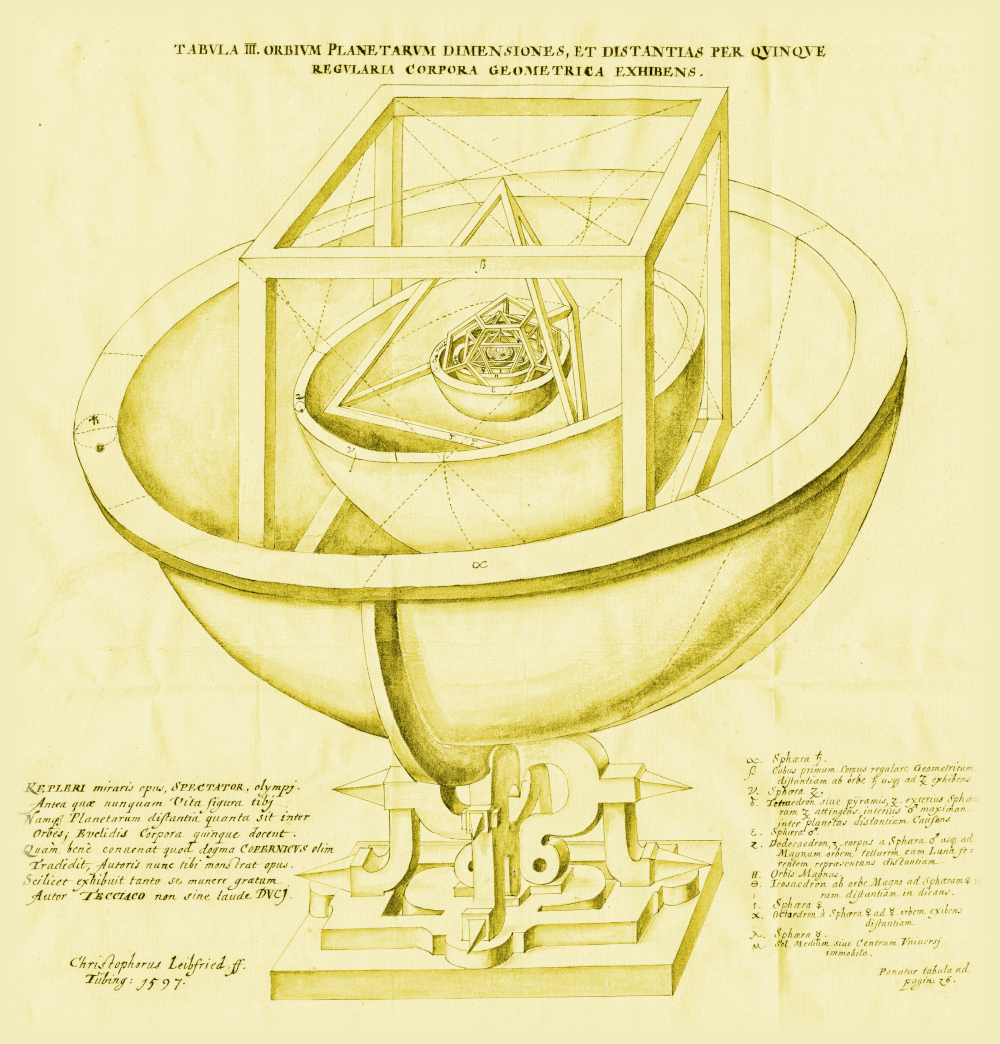
Further, most of these have “cross-disciplinary” ties to others through astrology, philosophy, astronomy, etc. For instance, in Timaeus Plato associates each of the four classical elements with one of the Platonic solids. In the late 16th century, in his Mysterium Cosmographicum, Johannes Kepler creates a model of the solar system that relates the size of the orbits of each of the planets of the solar system to one of the Platonic solids (this is before he arrived at his famous laws of planetary motion); in his model each of the orbits was situated between nested polyhedra on the surface of inscribed and circumscribed spheres. In turn, the elements were often associated to the humors and temperaments, and so forth. In this piece, any time I sought to emphasize one of these connections, I had the movements overlap, both in time and to a great extent in musical structure as well.
The six solo contrabass movements may be performed separately as a suite.

- Prelude 1:17
- Fugue No. 1 1:24
- From Donne, "The Flea" 4:10
- Bagatelle No. 1 0:40
- From Milton, "Paradise Lost" 4:01
- Bagatelle No. 2 0:59
- From Stevens, "Sunday Morning" 4:18
- Fugue No. 2 1:21
- Cavendish, "Severall Figur'd Atomes" 0:45
Embed
Copy and paste this code to your site to embed.
The driest ones deliver the greatest clarity to the pitch dimensions of the piece, while the wettest ones approach something like a continually evolving timbre.
- Dry 4:11
- Medium Dry 4:12
- Medium Wet 4:13
- Wet 4:15
- Oppressive 4:21
Embed
Copy and paste this code to your site to embed.